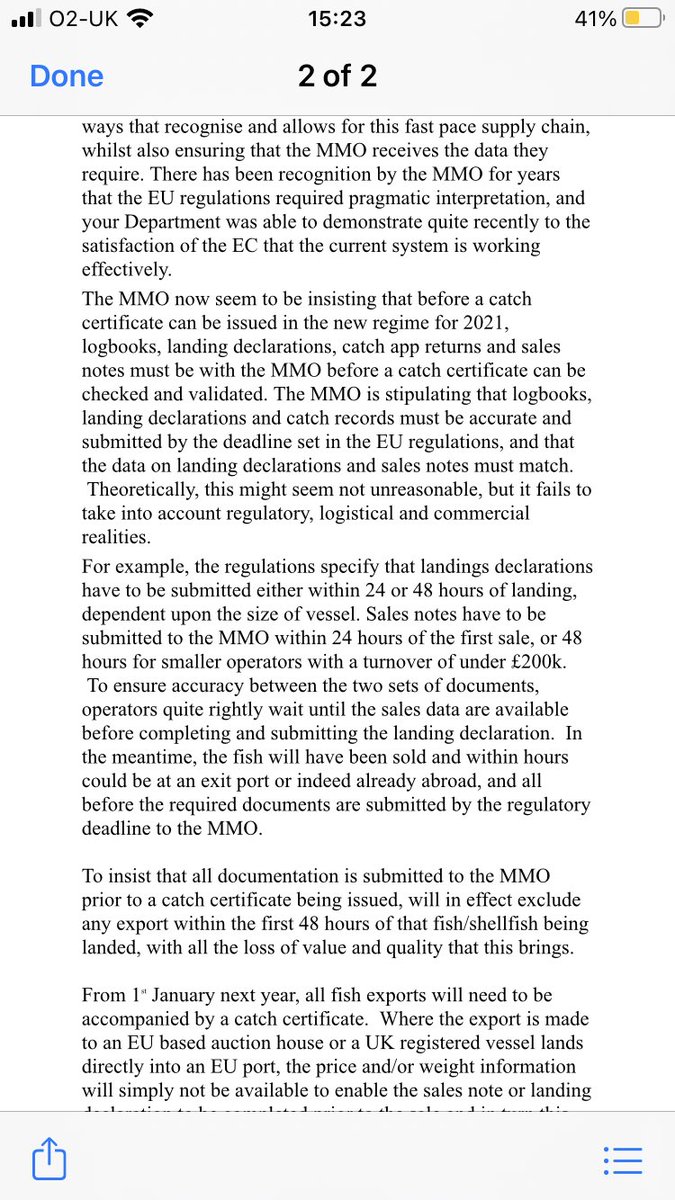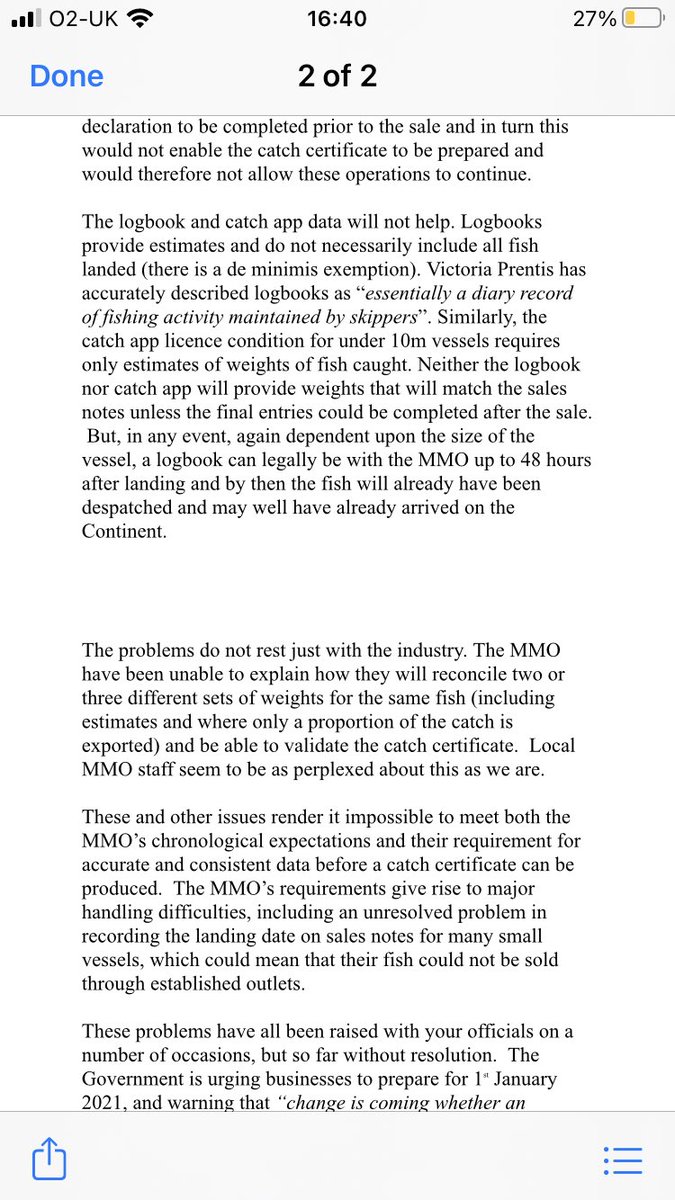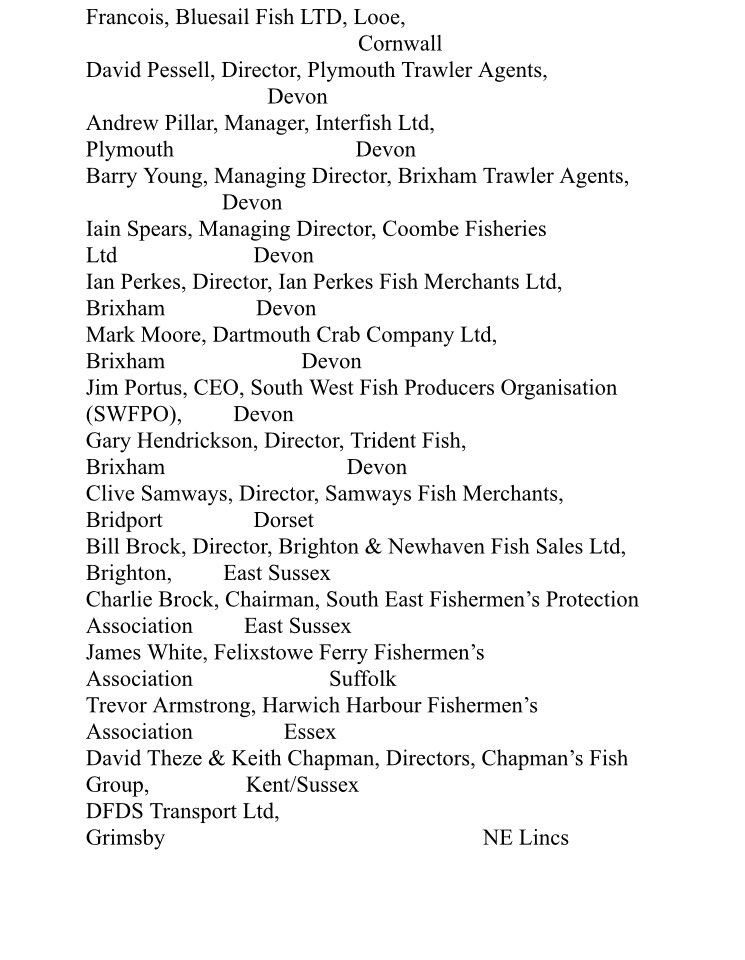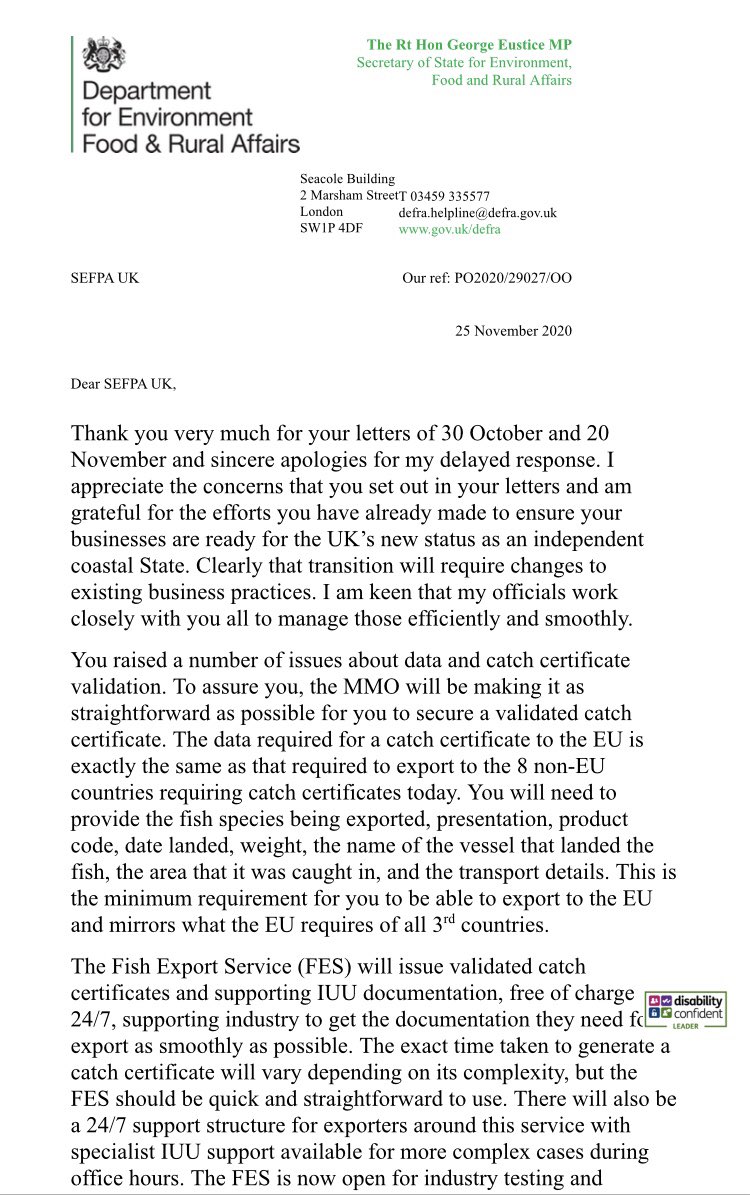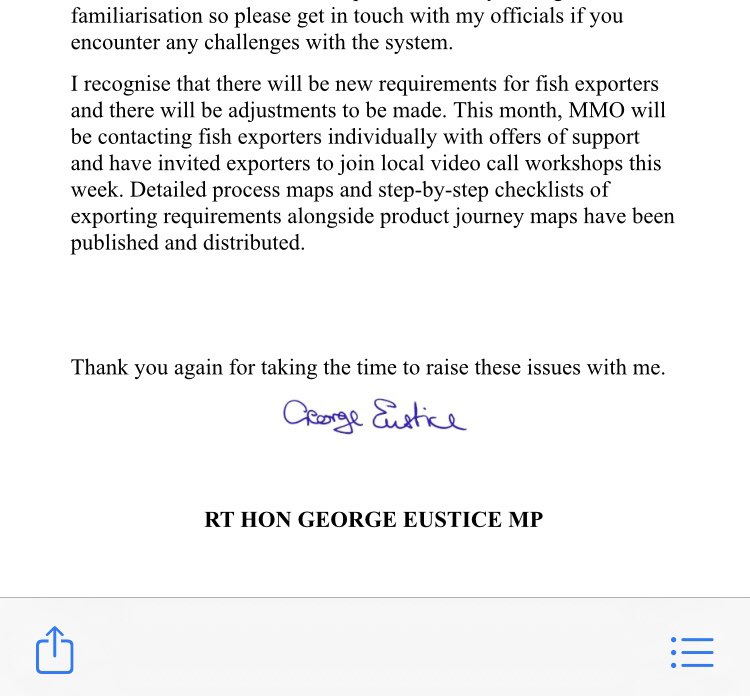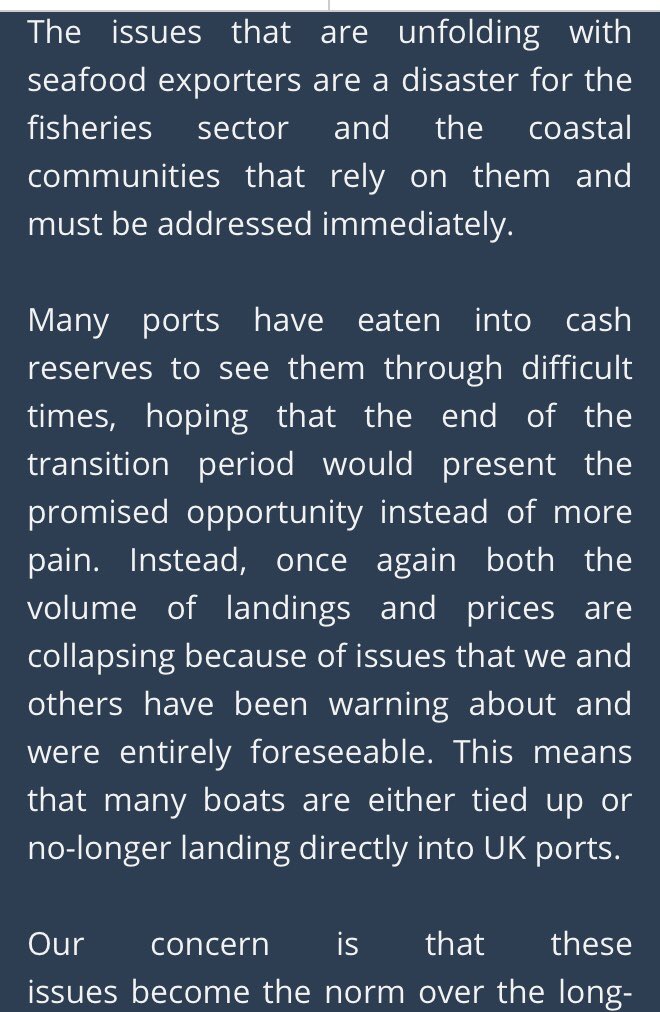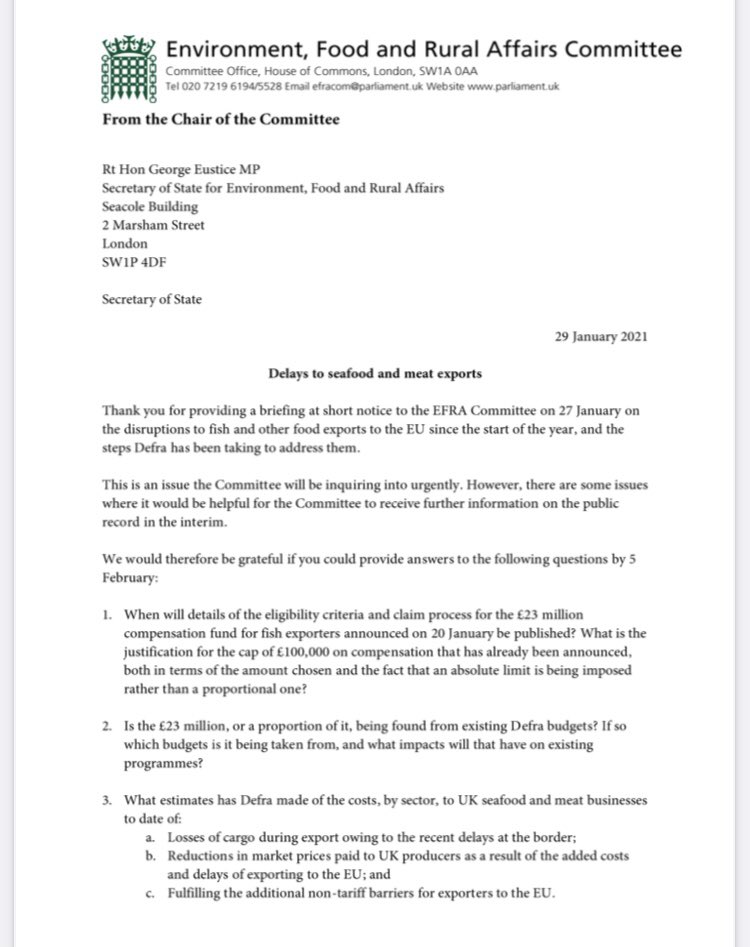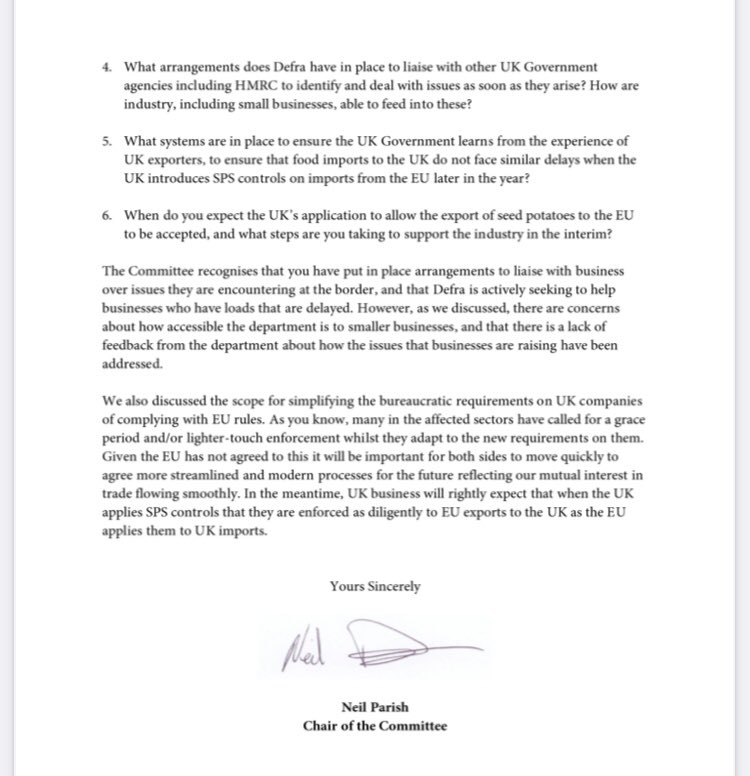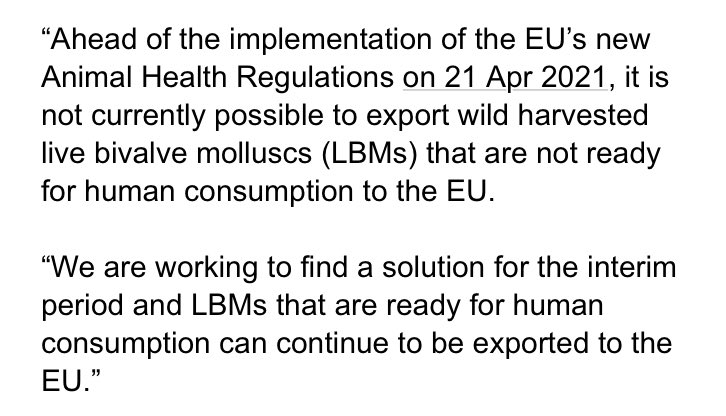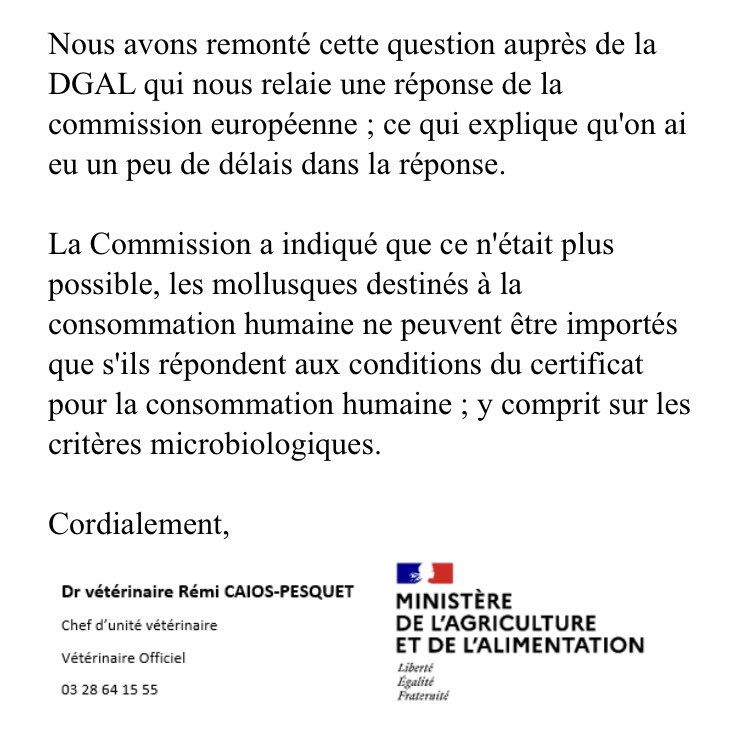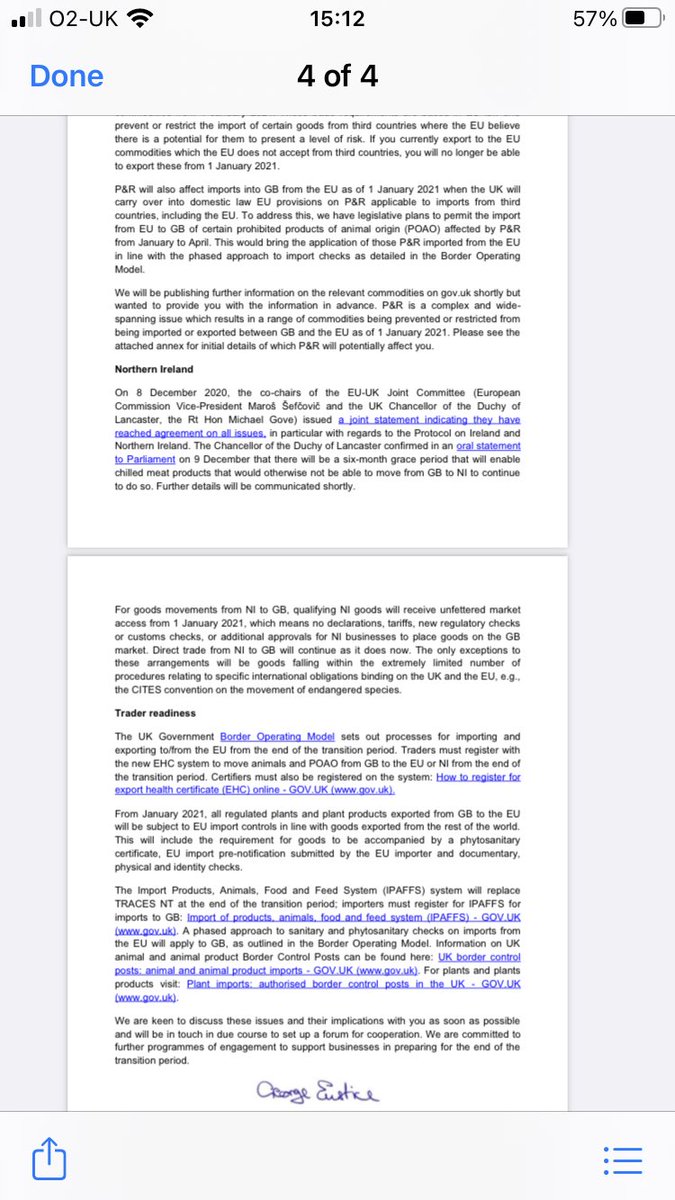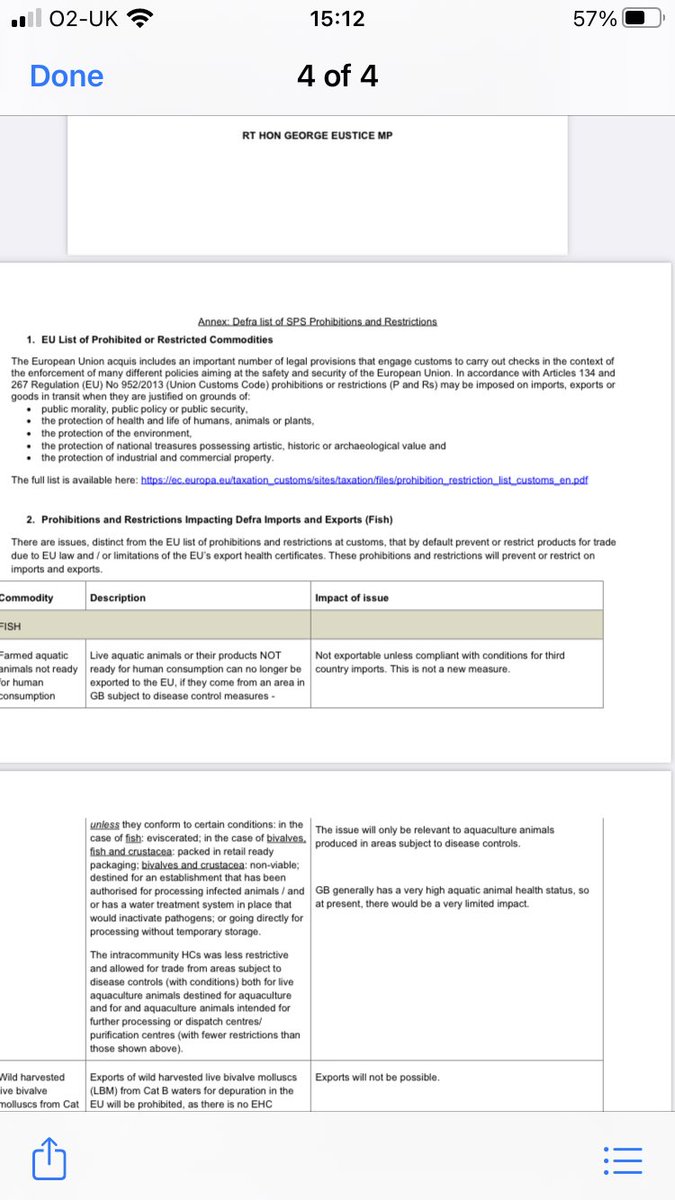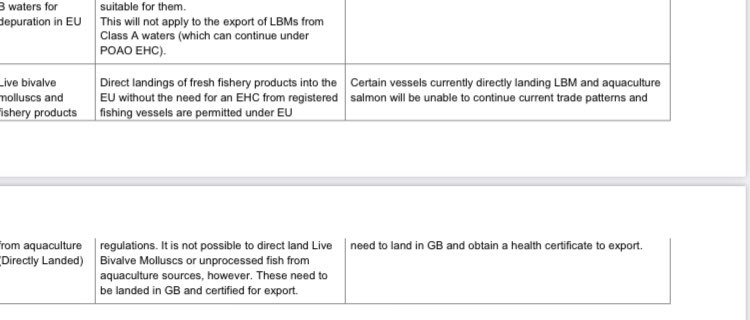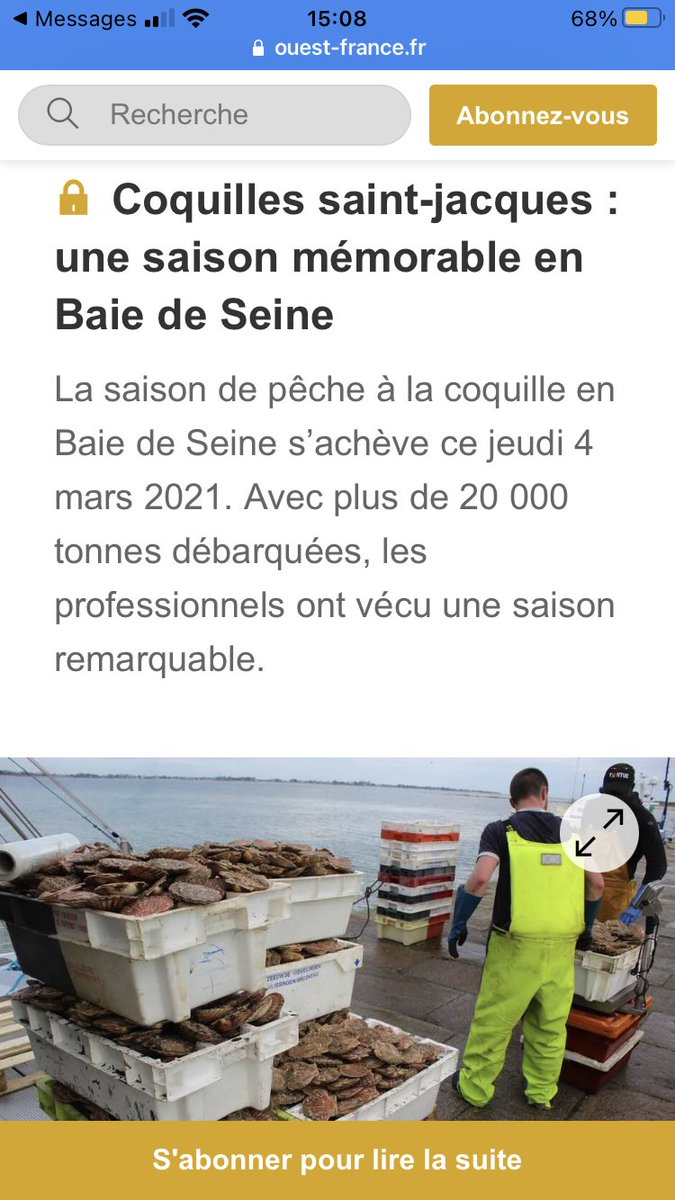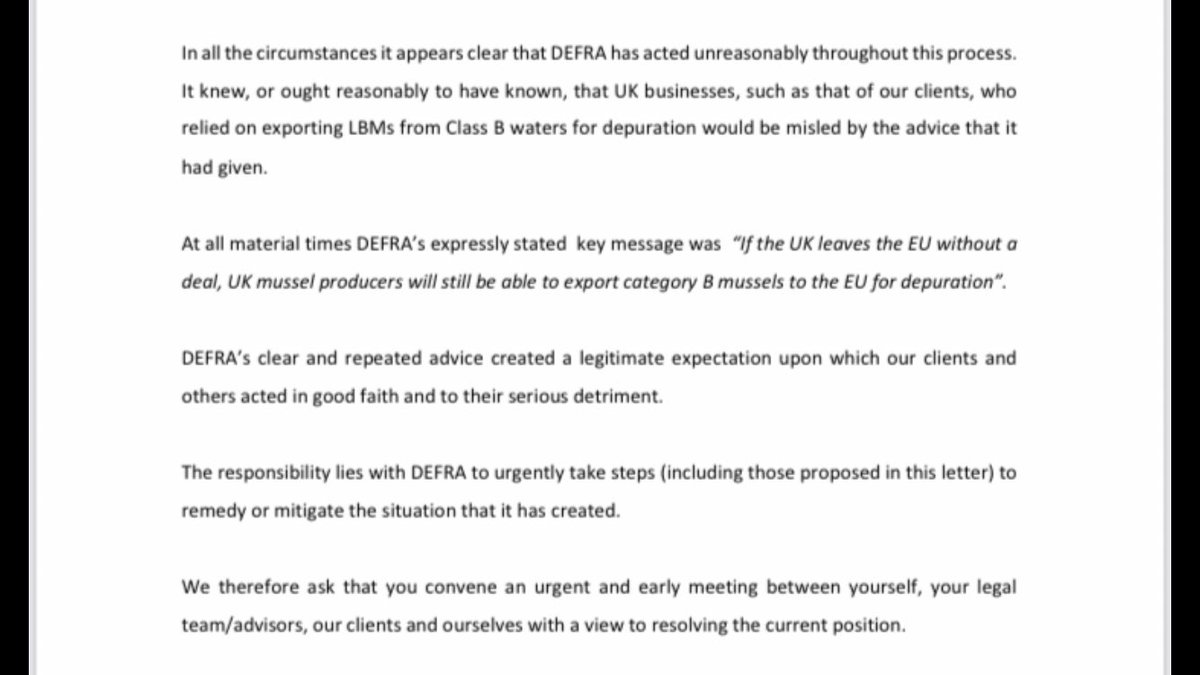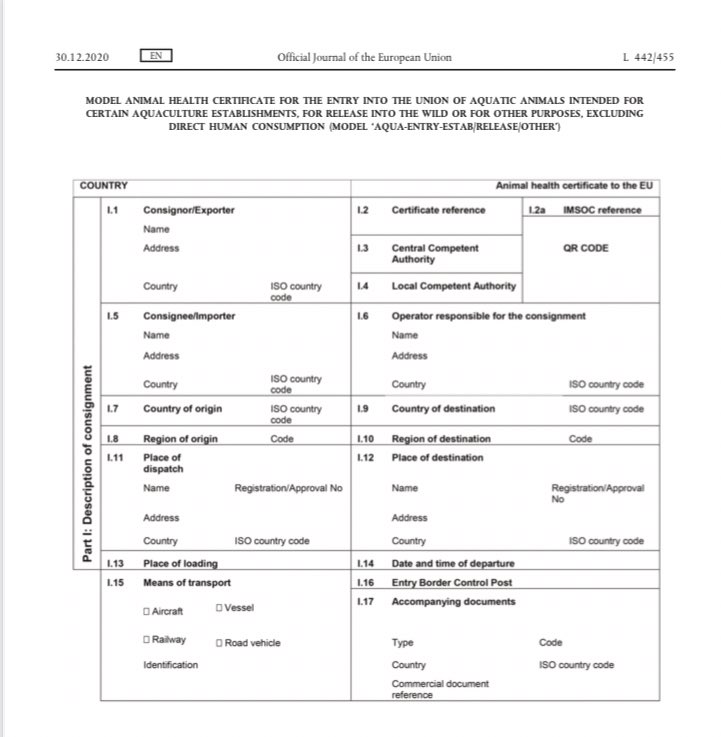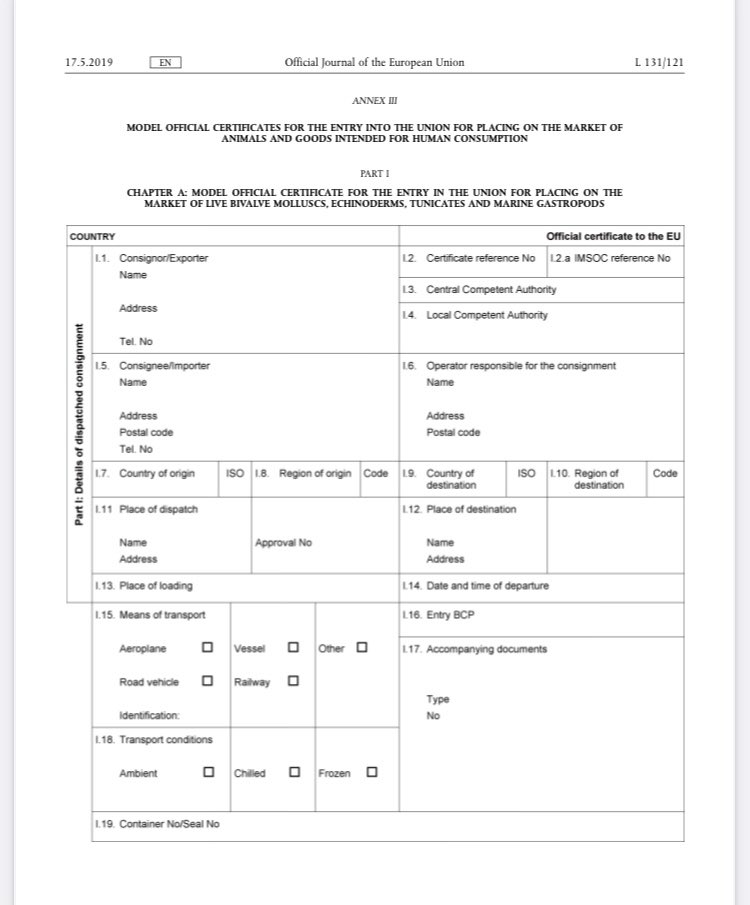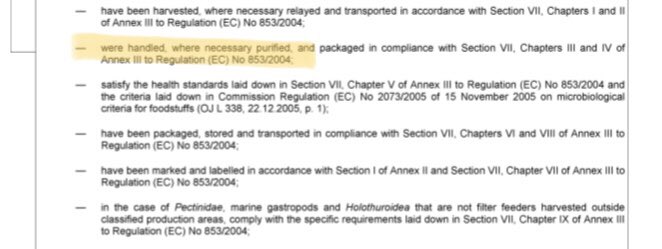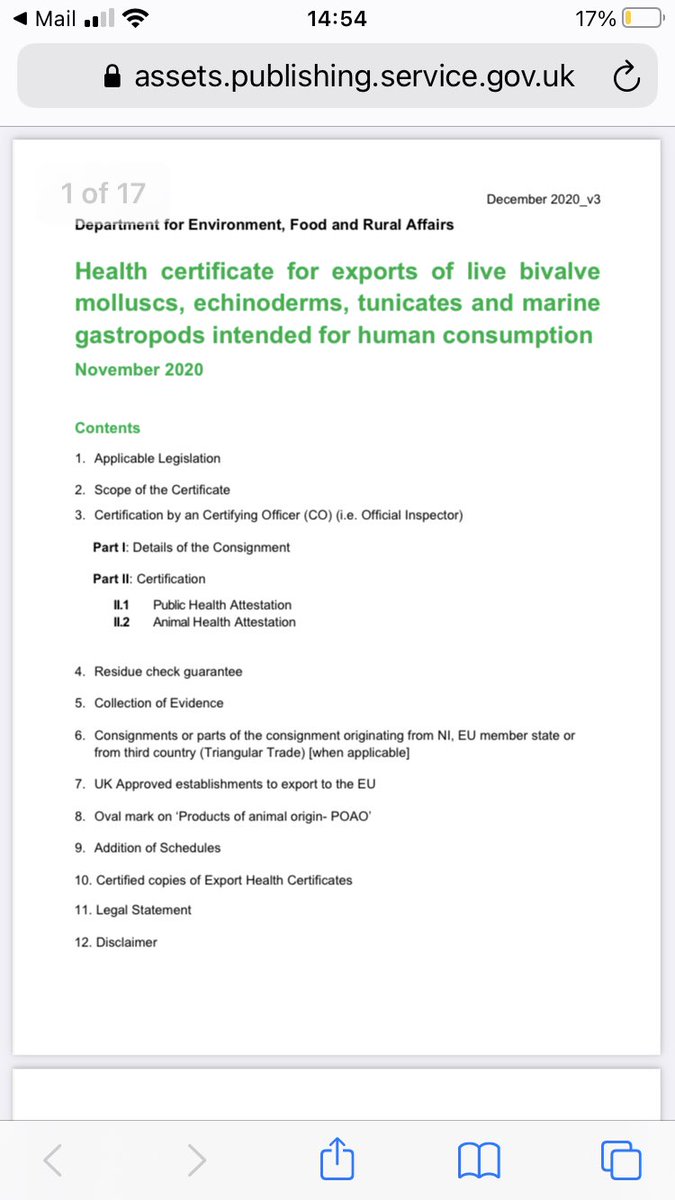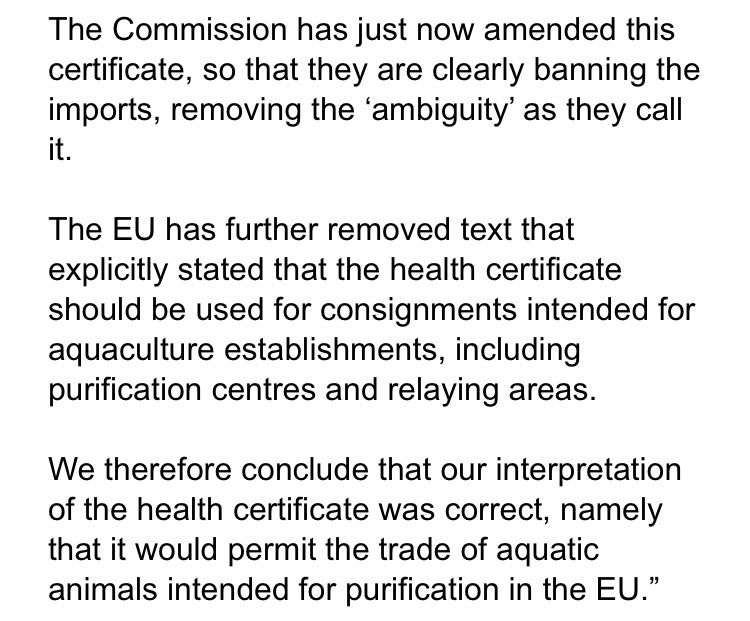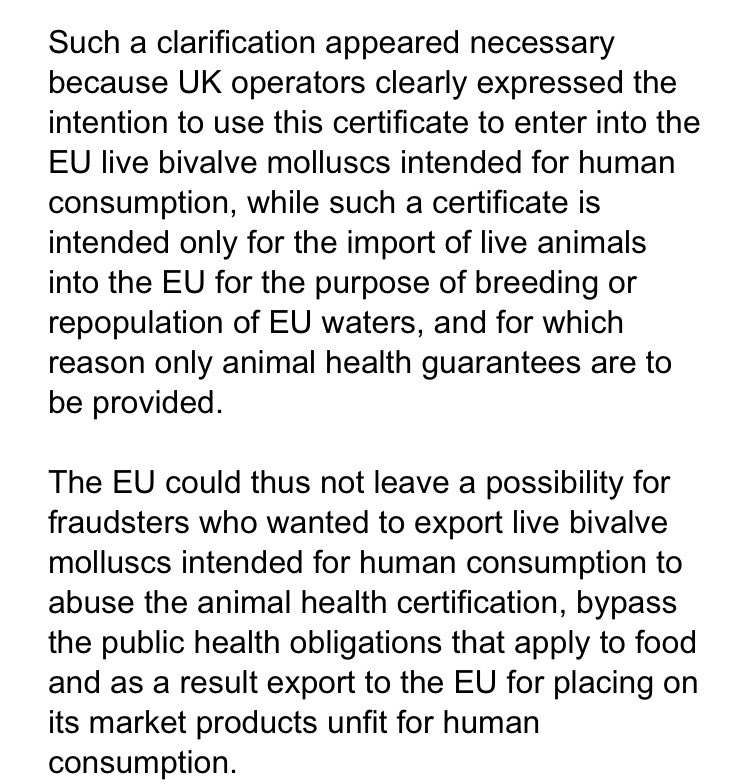“It could be the final straw for many businesses” - Fishing leaders warn that the bureaucratic requirements the government says are needed to export fish to the EU from 1 January will have a “seriously detrimental effect” on the industry.
“Any hold-up in the chain is going to be a complete disaster for us” Brixham fish merchant Ian Perkes.
“They’re absolutely impossible – it’s simply not possible to do what’s being asked” - former @DefraGovUK Director of Fisheries Rodney Anderson on the new rules the government says will be necessary to export fish to the EU from January 1.
Environment Secretary George Eustice says "there may have been some misunderstandings in the communication here between the @The_MMO and some local fishing groups".
George Eustice says catch certificates will be "automatically generated from a new IT system we& #39;ve set up that over two-thirds of fish exporters are already signed up to".
Environment Secretary George Eustice’s reply to the fishing industry leaders concerned about the new requirements for export to the EU from January 1.
Fish merchant Ian Perkes - who signed the original letter - says there was "nothing positive" in George Eustice& #39;s response and still insists the government has left the industry under-prepared for a "life-changing" moment which will see him incur "massive costs".
Fish merchant Ian Perkes says it "beggars belief" that he and his colleagues - buying from an auction served by multiple boats, each fishing in multiple locations - will be expected to identify where each species they export was caught.
Mr Perkes says the haulier he uses - carrying fish from several exporters in one load - has warned him that if a mistake with his paperwork leads to the truck being turned back at the border he will be liable for the retail value of the truck& #39;s entire load - which could be £150k.
"We& #39;re going to get our fish back, we& #39;re going to get our waters back, all the roses in the garden have come up, we& #39;ve died and gone to heaven - but it& #39;s not the case" - Fish merchant and Leave voter Ian Perkes says he& #39;s been "led down the garden path".
"We& #39;re stuffed" - Brixham fish merchant Ian Perkes says he& #39;s unable to export his fish to France now the new post-Brexit rules and regulation have come into force.
https://twitter.com/samwaysfish/status/1346886334850486278">https://twitter.com/samwaysfi...
"We have got European customers that have decided to stop purchasing...the reality of that is that the prices fall, so who does that have an impact on the most - it& #39;s our fishermen" - @charliesamways of Dorset fish merchants @SamwaysFish.
"One moment we& #39;re being told it& #39;s IT issues, the next it& #39;s coming back that it& #39;s paperwork and then they& #39;re not sure - it might be IT, it might be the Catch Certificate, it might be the Health Certificate" - @charliesamways of Dorset fish merchants @SamwaysFish.
. @DFDSGroup to resume Grouoage Export Service - where consignments of fish or shellfish from different fish merchants are sent in the same truck - on January 18, following its suspension on January 8. BUT based on a three-day delivery timescale rather than the usual 24 hours.
"To say its a kink, to say it& #39;s just a few teething problems is nonsense and it& #39;s dreadfully arrogant" - shellfish exporter Mark Moore of the Dartmouth Crab Co responds to the government& #39;s insistence that the industry& #39;s problems exporting to the EU are "only teething problems".
"I disagree with the way he& #39;s caricatured it" - Environment Secretary George Eustice responds. Says we& #39;ve seen "teething problems with some errors being made because some people are not as experienced as others about dealing with the paperwork".
George Eustice says "the larger fish processors - those that are used to trading around the world, people like @falfish down in Cornwall - have mastered the process quite quickly".
"We are looking at a support package and will be saying more shortly" - Environment Secretary George Eustice on @BorisJohnson& #39;s pledge to compensate fish exporters struggling to export their product to the EU.
"These aren& #39;t teething problems - these are system-wide issues with a new system that is inefficient, burdensome, expensive and going to put our fishing industry at a material disadvantage" - Shadow Environment Secretary @LukePollard.
"The whole process for exporting live shellfish doesn& #39;t fit the procedures that we have to follow" - Dylan Huxley of the Dartmouth Crab Company who drove his lorry to Westminster today to take part in the fish merchants& #39; protest against the new requirements for export to the EU.
"If we can& #39;t get some of these things changed it& #39;s not going to be viable for the likes of us to operate" - Dylan Huxley from the Dartmouth Crab Company.
“The issues that are unfolding with seafood exports are a disaster...Our concern is that these issues become the norm over the long-term” - Mark Simmonds, Director of Policy at @britishports.
Full release from @britishports here:
https://us12.campaign-archive.com/?u=9fa5533f9884aad39ffc18f0e&id=d55a1be759">https://us12.campaign-archive.com/...
https://us12.campaign-archive.com/?u=9fa5533f9884aad39ffc18f0e&id=d55a1be759">https://us12.campaign-archive.com/...
"We need to sit down & renegotiate some sort of free-flowing agreement" - fish merchant Andy Trust says post-Brexit regulations make it uneconomical for him to export fish to EU. Says Govt& #39;s claim that people need to get used to the new paperwork is "not going to be a solution".
. @CommonsEFRA chair @neil_parish says we "may have to play hardball" with the EU if "access to the market is not there".
. @CommonsEFRA launches urgent inquiry’s to Brexit border delays for meat and seafood exports.
“This needs to be gripped by the Government at the highest level before businesses go to the wall@ - @CommonsEFRA chair @neil_parish.
. @CommonsEFRA has also written to Environment Secretary asking for more detail on £23 million compensation fund for fish exporters & for estimates of cost to date to UK food businesses caused by border issues & delays. Answers requested by next Friday. https://committees.parliament.uk/publications/4505/documents/45371/default/">https://committees.parliament.uk/publicati...
"There isn& #39;t going to be a fishing industry in five years& #39; time - for every man at sea there& #39;s twenty ashore" - Cornish fish merchant Andy Trust. Says impact of Covid "pales into insignificance" compared to Brexit.
"This is going to finish the whole fishery here" - Fal oyster fisherman says his industry will be a "complete write-off" if the government can& #39;t negotiate a way around the EU rules banning the import of unpurified bivalve molluscs.
A month ago @DefraGovUK suggested the problem would be solved by April at the latest and possibly sooner.
Less than a fortnight later the French government relayed this response from the European Commission to @CornwallCouncil’s enquiry as to whether unpurified queen scallops could still be exported from the UK to the EU: “No longer possible”.
Today Environment Secretary George Eustice said the @EU_Commission had "changed its position" several times. Claims EU& #39;s starting position was to work towards approving export health certification. Says export ban "based on misinterpretation of their own laws and unjustified".
"Far from being in a position where we have an expanded fishing sector in five years& #39; time, there is a real danger of vessels going to the wall now and having no sector left" - @sheryllmurray (Conservative backbencher and Brexiteer with a background in the fishing industry).
Replying, Leader of the House @Jacob_Rees_Mogg said:"The initial difficulties are very serious that fishermen have faced and these are not taken lightly by the government".
"It& #39;s been an unmitigated disaster. We& #39;ve already seen seafood businesses close their doors & I suspect there are many more that are currently hanging on by their fingernails & going bankrupt slowly" - Marine & Fisheries Consultant @Giveitago1 giving evidence to @CommonsIntTrade.
"I have greater confidence in the future of our fishermen because they have lived with the Commons Fisheries Policy for 40-odd years and they found a way through and I believe they will find a way through here" - St Ives MP @DerekThomasUK who represents the port of Newlyn.
But @DerekThomasUK says the Prime Minister needs to "wade in and demonstrate his absolute commitment to the fishing industry by making sure that France is doing anything that they shouldn& #39;t be doing".
"The Commission have not replied to the letter yet. I understand from officials at the moment they& #39;re not minded to change their position" - Environment Secretary George Eustice on the Govt& #39;s challenge to EU ban on imports of unpurified bivalve molluscs like oyster and mussels.
"It is true that something is left even when you get it working well" - Environment Sec George Eustice asked if Govt still thinks difficulties with fish exports are "teething problems". Says Govt wants a "veterinary partnership agreement" with EU to "try & get some easements".
"We& #39;ve almost been promised the world and given nothing. It& #39;s heart-breaking to think the government would do that to an industry...The government need to be held accountable for what they& #39;ve done to us" - Plymouth fisherman Steve Walker speaking at @plymouthcc& #39;s fishing inquiry.
South East Cornwall MP @sheryllmurray says she& #39;s asked to meet the Prime Minister with a delegation of MPs from coastal constituencies to discuss the "desperate time" facing the fishing industry.
"If anybody can sell to the British public ‘buy red mullet, buy John Dory, buy grey mullet’, then I think he will have a darn good go" - @sheryllmurray wants @BorisJohnson to lead campaign to persuade people to eat British fish. She led group of coastal MPs meeting the PM today.
"The structural problems will not go away. No amount of top spin from the PM will change that. We are on verge of losing fishing jobs & I want more people to eat more British fish but this in itself will not save the fishing industry" - Shadow Environment Secretary @LukePollard
Letter from Environment Secretary George Eustice to “colleagues” on 10 December makes it clear that the export of unpurified live bivalve molluscs from UK to EU would be prohibited from January 1 this year. There is no caveat about it being a temporary ban or under negotiation.
Pollack fisherman Graeme Searle says he & his colleagues been told their quota for the species has been cut by SEVENTY per cent this year compared to last. Under the Govt& #39;s Brexit deal the extra 5% of Total Allowable Catch for pollack was one of the more generous uplifts.
. @DefraGovUK points out that on scientific advice the Total Allowable catch for pollack has itself been reduced by 73% - but the practical upshot is that people like Graeme are seeing a massive cut in the amount of fish they can catch.
This is set against the backdrop of disappointment over the quota increases in SW waters in the first place. And the objection that Total Available Catch limits don& #39;t necessarily reflect the real numbers of catchable fish.
Quota swaps between Fish Producer Organisations in different EU member states - previously a common practice in the UK - are also now impossible.
"Teething problems we thought was a particularly poor choice of words...at least 80% of the trading difficulties that have been encountered are still in existence today" - Martyn Youell of fishing company Waterdance giving evidence to @CommonsEFRA two months in to the new régime.
"It& #39;s almost like an evil plan was conducted to undermine the fishing industry". Also says nobody in the Brixham-based supply chain (Brixham is the highest value fishing port in England) has been eligible to apply for compensation from the Govt& #39;s Seafood Disruption Support Scheme
UK’s post-Brexit export woes credited with boosting the price of French scallops during a bumper season for scallop fishermen off the coast of Normandy. @OuestFrance
1/2 “Brexit has helped us”, says Dimitri Rogoff @Pecheur_pro président du comité régional des pêches de Normandie.
2/2 "The UK’s sanitary measures have lengthened the time needed to export scallop meat. Even if it’s a bit more expensive, customers have preferred the fresh product from Normandy” - Dimitri Rogoff @Pecheur_pro, président du comité régional des pêches de Normandie.
"We& #39;re losing clients so in four or five months& #39; time I really don& #39;t know where we& #39;re going to be" - Brixham fish merchant Ian Perkes (originally interviewed at the top of this thread in November) on how his business is faring.
"I find it very difficult to see how we are going to move forward. I feel pretty pessimistic about it to be honest" - @lordtev who chairs the @UKHouseofLords committee scrutinising fish exports to the EU. @LordsEUCom
"I& #39;ve spoken to a number of representatives of the fishing industry locally who acknowledge it& #39;s very difficult to know exactly where we are at the moment because the impact of Covid on demand in the market is still there" - @stevedouble, MP for the fishing port of Mevagissey.
. @BorisJohnson offers to make a fish pie to promote domestic consumption of British fish. Prompted by this question from @sheryllmurray.
"For the majority of shellfish exporters it would be of absolutely no benefit at all. It would shorten the shelf life so much that it would barely arrive alive." - Cornish shellfish exporter Martin Laity on invitation to apply for Govt grants to invest in purification tanks here.
"It;s just a no, no" - Martin Laity says he& #39;s been building and designing shellfish purification systems around the world for more than 30 years. "So I know a thing or two about purification and it isn& #39;t the solution".
Shellfish exporter Martin Laity suggests a "quick, cheap fix" to the EU ban on unpurified bivalve molluscs from Category B waters is to "align" our water classification criteria with other European counties. Says they have far more Category A waters while we have 1%.
"There reaches a point where we& #39;ve got to make our minds up whether to basically stop and demolish the farm, take it apart and...I don& #39;t know...go on the dole, I suppose. It& #39;s a dreadful situation". Lyme Bay mussel farmer John Holmyard of @OffshoreShell.
"There is a global trade in this, admittedly more on the processed side" - Environment Secretary George Eustice appears to concede that more purification tanks here won& #39;t be hugely helpful in reviving the EU export trade & that exporters might have to find completely new markets.
Environment Secretary George Eustice says he& #39;s looked at changing the way in which water quality is classified, as requested by the shellfish industry (bivalve molluscs from Category A waters can be exported without restriction), but concluded "it doesn& #39;t actually help". @SAGB
"Of course we can show you" - I asked Environment Secretary George Eustice if he can produce the correspondence with the @EU_Commission in which they undertook to provide a new Health Certificate for export of undepurated live bivalve molluscs from Class B/C waters from April 21
I asked George Eustice for the evidence supporting the Government& #39;s claim that fish and shellfish exports to the EU are back to 85% of normal levels. He says that& #39;s been the case since the end of January.
"You can& #39;t get a twenty-tonne truckload of live mussels anywhere other than Europe" - Mussel farmer John Holmyard of @OffshoreShell on the suggestion that the industry could seek alternative markets.
"A moment will come soon, in the next week or two, where either an agreement will take place or we will all agree to proceed without an agreement and that means there won& #39;t be mutual sharing arrangements with Norway" - Environment Secretary George Eustice on quota negotiations.
"It& #39;s costing about 15-20% more to export to continental Europe but the burden of that will fall disproportionately on the smaller operator...and that could lead to driving them out of the market altogether" - Eddie Green of seafood hauliers @DFDSGroup speaking to @CommonsEFRA.
Truro & Falmouth MP Cherilyn Mackrory, who represents shellfish producers on the Fal currently banned from exporting unpurified molluscs to the EU, says Govt should challenge the legality of the ban using the dispute settlement provision in the Trade and Co-operation Agreement.
Just over a week ago the Environment Secretary described the ban as "indefensible" but said it was "something we can& #39;t stop them [the EU] doing if that& #39;s what they want to do".
Giving evidence to @CommonsEFRA, George Eustice says it& #39;s not yet possible to challenge the EU& #39;s prohibition on the import of unpurified live bivalve molluscs from Class B waters using provisions in the TCA because the TCA still hasn& #39;t been ratified by the European Parliament.
Earlier he said: "We have to accept they have taken a policy stance...if they take a position that they just want the abolition of the trade altogether then our ability to change that position is quite limited I’m afraid. We can’t force them to do something they don’t want to do”
Both the Secretary of State and @DefraGovUK& #39;s DG of Farming and Biosecurity pretty blunt about the fact the future is bleak for small exporters of fish or cheese sending small consignments to the EU. George Eustice suggests they "consolidate around an export agent".
“The responsibility lies with DEFRA to urgently take steps to remedy or mitigate the situation it has created” - mussel farmers @OffshoreShell send legal letter to Environment Secretary calling for redress for the effects of the ban on sending their mussels to the EU unpurified.
. @DefraGovUK has produced the EU Health Certificate, due to take effect from 21 April, which they say should allow the export of unpurified wild bivalve mussels from Class B waters into the EU.
"A model animal health certificate for the entry into the Union of consignments of aquatic animals intended for certain aquaculture establishments, for release into the wild, or for other purposes excluding human consumption".
They point to the notes on the certificate which include, "This certificate is to be used for the entry into the Union of consignments of live aquatic animals intended for all other aquaculture establishments including purification centres and relaying areas."
This, they say, makes "the future intention to allow export of wild bivalve molluscs for the purpose of further depuration clear".
The @EU_Commission points to another certificate in another Regulation: “A Model Official Certificate for the entry in the Union for placing on the market of live bivalve molluscs, echinoderms, tunicates and marine gastropods”.
To be clear, this legislation is not repealed by the Regulation to come into force on 21 April which DEFRA cites.
DEFRA was very much aware of the regulation the EU cites because before Christmas they issued this guidance based on it.
Which goes to some lengths to stress that this certificate it cannot be used to export unpurified live bivalve molluscs from Class B waters into the EU.
So the question I’ve asked @DefraGovUK is on what basis the view was taken that the new Regulation (2020/2036) would override the quite specific provisions relating to live bivalve molluscs in the earlier one (2019/628).
And is there written correspondence with the @EU_Commission in which the latter gave assurances to that effect?
A further twist today. Giving evidence to @CommonsEFRA, the Environment Secretary said: “The fact that the EU have now changed their rules is somewhat an admission that their own interpretation of their rules was wrong".
Which appears to suggest that beyond the disagreement over the correct interpretation of the original regulations, the EU has now, very rapidly, introduced new legislation. So can either @DefraGovUK or @EU_Commission shed any light on that?
. @Defra enlarged on the Environment Secretary’s claim the the EU had recently changed the rules to prevent export of live bivalve molluscs from Class B waters in this blog:
In a rare intervention the @EU_Commission has now hit back, saying “clarification appeared necessary” to prevent “a possibility for fraudsters who wanted to export live bivalve molluscs intended for human consumption to abuse the animal health certification”.
"As far as I can see they& #39;ve not changed the regulations by a single word, what they have changed is some of the wording in one of the certificates which clarifies things that obviously Defra found slightly difficult to comprehend" - mussel farmer John Holmyard of @OffshoreShell
In a recent presentation to the shellfish industry, Defra urged businesses to “adapt to these new trading conditions” and says it “can’t provide financial support for businesses with no adaptation plan”. @SAGB
"It just shows the shallowness of their understanding of our industry....otherwise they would understand what they& #39;re talking is complete rubbish" - mussel farmer John Holmyard of @OffshoreShell on the Government& #39;s advice to "adapt" to not being able to export to the EU.
The Food Standards Agency& #39;s latest updated classification of English waters (April 1) still leaves the vast majority as Class B or below, either permanently or during the harvesting season.
https://www.dailymail.co.uk/news/article-9482355/Shellfish-war-UK-EU-nears-resolution-fishermen-green-light-export-catches.html">https://www.dailymail.co.uk/news/arti...
https://www.dailymail.co.uk/news/article-9482355/Shellfish-war-UK-EU-nears-resolution-fishermen-green-light-export-catches.html">https://www.dailymail.co.uk/news/arti...
Here is the full list on the @foodgov website:
https://www.food.gov.uk/sites/default/files/media/document/classification-list-1-april-2021_0.pdf">https://www.food.gov.uk/sites/def...
https://www.food.gov.uk/sites/default/files/media/document/classification-list-1-april-2021_0.pdf">https://www.food.gov.uk/sites/def...
. @CommonsEFRA report on Seafood and Meat Exports to the EU says exporters “have not received the standard of support they should have done to allow them to prepare. Guidance was not sufficiently timely, targeted or joined-up”.
. @CommonsEFRA report says: “Despite overcoming initial “teething problems” the new barriers small seafood and meat export businesses face could render them unviable, and factories and jobs may relocate to the EU”.
The report says “the confusion about the EU’s requirements on purification of live bivalve molluscs also demonstrated Defra’s failure to properly consult with stakeholders prior to the end of the transition period”.
“Defra should have engaged with exporters more closely, in this case by sharing information it had received from the European Commission allowing the industry to point out that it did not provide the clarity Defra officials thought it did. This resulted in Govt making a mistake”.
“Govt sometimes does know best, in this instance it did not...Secretary of State believed he had this agreement with the European Commission but it didn’t turn out to be so” - @CommonsEFRA chair @neil_parish on rules barring export of live bivalve molluscs for purification in EU.
. @CommonsEFRA report also says: “If the Government believes the EU to be legally incorrect [in barring import of live bivalve molluscs for purification prior to consumption], the Government should urgently challenge the European Commission’s stance”.

 Read on Twitter
Read on Twitter

